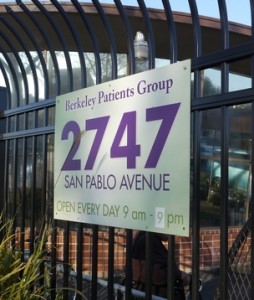The letter cited violations of federal law and the fact that the outlet is within 1,000 feet of two schools: the Center for Early Intervention on Deafness, which also houses a preschool, and Ecole Bilingue de Berkeley, a French bilingual grade school.
“Marijuana dispensaries are full of cash and they’re full of marijuana, and everybody knows that,” Haag said in an interview. “They are at risk of being robbed, and many of them are robbed.”
While marijuana is illegal under federal law, Haag said she doesn’t have the resources to target all the medical pot outlets that have proliferated in her district in recent years. So, she said, her office is focusing on protecting children.
“When a dispensary comes to my attention that is close to a school, a park or a playground or to children, that’s a line I’ve decided to draw, and those are the dispensaries that I’m looking at,” Haag said.
Since federal prosecutors announced a statewide crackdown in October, Haag said her office has sent letters to a number of dispensaries, including Berkeley Patients Group and an outlet in Santa Cruz that was robbed by armed gunmen in February. The outlet is next to a preschool.
“People in the community may be supportive of the dispensary,” Haag said, “until there’s an armed robbery and people come running out of the dispensary shooting guns.”
Berkeley Patients Group’s owners declined interview requests, but supporters said the outlet has never been the scene of violence or an armed robbery. The group issued a statement reading: “BPG remains committed to providing safe and affordable access to its patient-members, while working to preserve the jobs of its 70+ employees. We are grateful for the level of support we have received from the Berkeley community over the years.”
The dispensary enjoys widespread support among local officials. In 2009, the Berkeley City Council proclaimed a special day to honor the group.
“I tell people that the Berkeley Patients Group is the Brooks Brothers of medical marijuana dispensing,” said Polly Armstrong, co-CEO of the Berkeley Chamber of Commerce. She said the dispensary has donated thousands of dollars to the chamber and other civic groups over the years.
That sentiment is shared by Jill Ellis, executive director of the Center for Early Intervention on Deafness, one of the schools cited in the warning letter from federal prosecutors.
“They really have been caring, supportive neighbors, concerned neighbors, clearly very interested in our mission, our families,” Ellis said. “Their security provides a great asset and enhancement to our
community. We’ve never had any incidents at all.”
The order to vacate comes at an inopportune time for the dispensary. Berkeley Patients Group still owes the state about $6.3 million in back taxes, interest and fees for marijuana sales from 2004 to 2007.
And the group faces a tough real estate market. Adam Peterson, a real estate agent for Cassidy Turley BT Commercial whose expertise includes the Berkeley market, said the dispensary has wanted to move for three years due to redevelopment on San Pablo Avenue, but the owners haven’t found a location.
“It’s almost impossible to relocate, especially under the rules and regulations that the cities and state have in place right now,” he said.
Only one property in Berkeley meets both state and local guidelines, Peterson said, and it’s not for rent to a dispensary.
But Dale Gieringer, state coordinator for the California chapter of the National Organization for the Reform of Marijuana Laws, said he thinks the dispensary will find a new home and outlast the latest crackdown.
“That’s what we’ve seen with previous federal crackdowns,” he said. “They’re disruptive at first, then people move somewhere else or change their business plans.”
Prominent Oakland medical marijuana activist and businessman Richard Lee has been forced to move his dispensary twice due to warnings from federal prosecutors.

